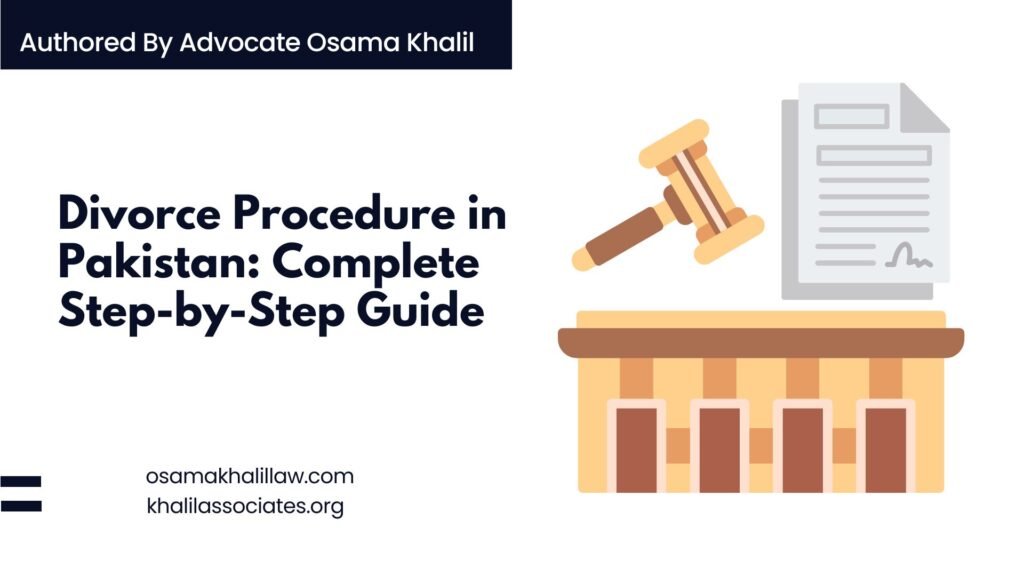
In Pakistan, couples can end their marriage through different methods. The divorce procedure in Pakistan depends on whether the husband or wife initiates it. Additionally, Islamic laws and the Family Courts Act govern the process. Therefore, understanding the divorce process in Pakistan helps avoid legal complications.
Types of Divorce in Pakistan
Pakistan recognizes three main types of divorce. Each follows a different divorce procedure in Pakistan.
1. Talaq (Divorce by Husband)
The husband can give Talaq to his wife verbally or in writing. However, the process must follow Islamic rules. First, he pronounces Talaq once. Then, they observe the waiting period (Iddat). After that, if he repeats Talaq twice more, the divorce becomes final.
2. Khula (Divorce by Wife)
If the wife wants a divorce, she can file for Khula. She must submit a Khula application in family court. Then, the court examines the case. If reconciliation fails, the court grants Khula. However, she may return her dowry (Haq Mehr) to the husband.
3. Mutual Divorce (Mubarat)
When both spouses agree to separate, they can opt for mutual divorce. They draft a mutual agreement. Then, they submit it to the court for approval. This method is quicker and avoids lengthy court battles.
Step-by-Step Divorce Process in Pakistan
The divorce procedure in Pakistan involves several steps. The exact process depends on the type of divorce.
Step 1: Initiation of Divorce
First, the spouse who wants divorce must decide the method. If it’s Talaq, the husband pronounces it. If it’s Khula, the wife files a case. For mutual divorce, both spouses must agree.
Step 2: Reconciliation Efforts
Before finalizing the divorce, the law encourages reconciliation. The family court may appoint arbitrators. They try to resolve disputes between the couple. If reconciliation fails, the process continues.
Step 3: Submission of Divorce Application
Next, the applicant submits the required documents to the family court. These include:
- Marriage certificate (Nikah Nama)
- CNIC copies of both spouses
- Divorce deed (for Talaq)
- Application for Khula (if filed by wife)
Step 4: Court Proceedings
The court examines the case. Both parties present their arguments. The judge may ask for additional evidence. If the court is satisfied, it issues a divorce decree.
Step 5: Completion of Iddat Period
After divorce, the wife must observe Iddat. This waiting period lasts three menstrual cycles. It ensures there is no pregnancy. If she is pregnant, Iddat extends until delivery.
Step 6: Final Divorce Certificate
Once Iddat completes, the court issues a final divorce certificate. This document legally ends the marriage. Both parties can remarry after this.
Required Documents for Divorce in Pakistan
To complete the divorce procedure in Pakistan, you need certain documents. These include:
- Original Nikah Nama
- Copies of CNIC
- Divorce application (for Khula)
- Affidavits (if required)
- Proof of Haq Mehr payment (if applicable)
Timeframe for Divorce in Pakistan
The duration of the divorce process in Pakistan varies. A mutual divorce may take a few weeks. However, contested cases can take months or years. Khula cases usually resolve within six months.
Legal Rights After Divorce in Pakistan
After divorce, both spouses have certain rights. The wife can claim maintenance during Iddat. She also retains custody of young children. The husband must provide child support. Additionally, the wife can reclaim her dowry if not already given.
Common Challenges in Divorce Cases
Many couples face difficulties during the divorce process in Pakistan. Some common issues include:
- Delays in court proceedings
- Disputes over child custody
- Non-payment of Haq Mehr
- False allegations to prolong the case
How to Avoid Complications in Divorce
To ensure a smooth divorce procedure in Pakistan, follow these tips:
- Hire a skilled family lawyer
- Keep all legal documents ready
- Avoid unnecessary court fights
- Settle matters like child custody mutually
Conclusion
Understanding the divorce procedure in Pakistan helps couples navigate the legal process smoothly. Whether it’s Talaq, Khula, or mutual divorce, each method has specific steps. Therefore, consulting a lawyer ensures compliance with legal requirements. By following the correct divorce process in Pakistan, couples can avoid unnecessary delays and disputes.
Legal Assistance
For professional legal guidance and support in immigration matters, you may contact:
Mr. Osama Khalil
Lawyer & Legal Consultant
📞 Phone: 0316-1829946
📧 Email: contact@osamakhalillaw.com | contact@khalilassociates.org
